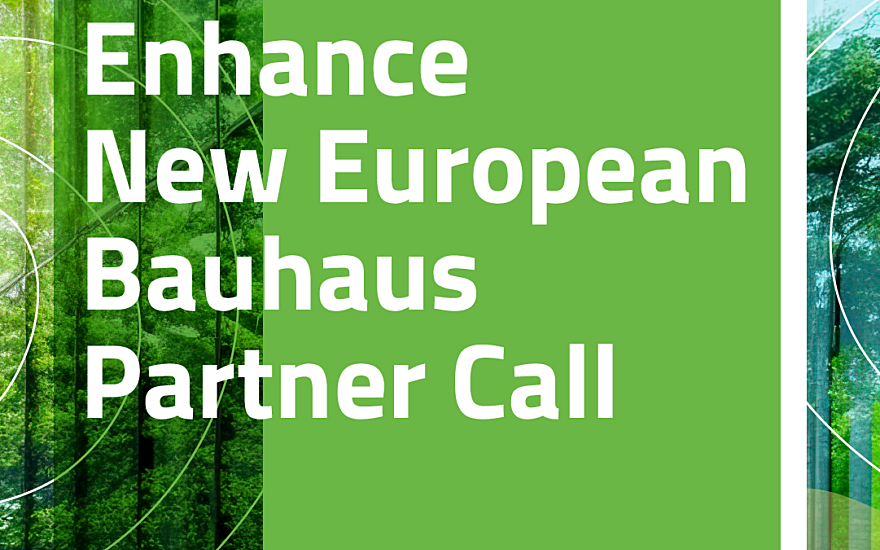About EIT Community NEB
The New European Bauhaus (NEB) initiative, initiated in early 2021, is an interdisciplinary movement translating the European Green Deal into tangible changes enhancing people's lives. It prioritises innovation for people over profit, envisioning a sustainable and inclusive future that appeals to our senses and minds.
The EIT Community NEB supports on-the-ground projects embodying NEB's values, covering fields like climate, culture, digital, food systems, and urban mobility. It encourages innovative solutions through start-ups, capacity building, and citizen engagement.

Enhance NEB: Scaling Up Promising Projects
Enhance NEB invites EIT Community NEB partners who implemented Connect NEB and Co-create NEB projects during 2022 and 2023 to scale up their initiatives. It supports consortia of at least two EIT Community NEB partners, including a city, region, or affiliated entity. It also welcomes new city or regional entities.
The objective is to amplify project impact either locally or by replicating it elsewhere, aligning with NEB principles of sustainable design and fostering dialogue across cultures and demographics.
Supported Activities and Expected Outcomes
Proposals should focus on increasing impact within the same location (Outcome A) or expanding it to a new location (Outcome B). Supported activities include product development, public realm co-design, and social activation and education.
EIT Funding Allocation
Selected projects receive 80% funding, up to €40,000 per project. The remaining 20% must be co-funded by the consortium. Eight projects will be chosen, ideally representing each EIT Community NEB Challenge, implemented across EU Member States or Horizon Europe Associated Countries from June to December 2024.
Previous Supported Projects
The Enhance NEB programme has previously supported several innovative projects that align with the objectives of the New European Bauhaus. Here are some examples of these projects:

Neiva Community Lab, Portugal
The Neiva Community Lab is an experimental initiative that connects the local community with regional, national, and international stakeholders to transform the area surrounding the mouth of the river Neiva in northwest Portugal. This project addresses challenges related to climate change, biodiversity threats, and socio-economic issues commonly found in semi-rural settings. By embracing a mission-driven approach, the Neiva Community Lab aims to create a sustainable development plan for the area, benefiting the community, stakeholders, and the entire region.

Spread the LoTs, Slovenia
Spread the LoTs is a project that focuses on the concept of Libraries of Things (LoTs). LoTs are libraries where people can borrow various items beyond books, such as electric tools, camping gear, and sewing machines. The project aims to demonstrate the broader social and environmental impact of the sharing economy. It has successfully established LoT locations in Slovenia, and the Enhance NEB program will fund the establishment of two new LoT locations in Nova Gorica and Velenje. The project works closely with local citizens to ensure the long-term financial sustainability of LoT locations while promoting the circular economy.

Harbors Barcelona, Spain
Harbors Barcelona is a project that explores the maritime heritage of Barcelona and its connection to the community. Through a community boat-building project, the initiative aims to engage young people and raise awareness about ethical consumerism, the impact of industry, beach cleaning, and the consequences of climate change. Participants in the project co-design and build their own wooden boats, fostering a sense of connection to the sea and a sense of belonging to the community.

Awaiting Recovery (AwaRe), Slovenia
The AwaRe project focuses on enhancing the open spaces surrounding the clinics of the University Medical Centre of Ljubljana (UMC) in Slovenia. The project aims to improve walkability and accessibility within the UMC, engaging healthcare professionals, patients, and their relatives in the design process. By involving the community in the creation of accessible and open spaces, the project aims to promote well-being and aid in the recovery process.

Play AUT the Box, Spain
Play AUT the Box is a project that aims to create autism-friendly play areas in public spaces. By involving experts from various disciplines, carpentry students, and families of children with Autism Spectrum Disorder (ASD), the project seeks to co-design play infrastructure that caters to the specific needs of children with autism. Through a collaborative and iterative process, the project develops autism- and environmentally friendly versions of play containers and their contents.

The Living Corridor, Italy
The Living Corridor project, based in Turin, Italy, aims to engage the local community in participatory co-creation initiatives. The project focuses on setting up a corridor of planters, a neighbourhood tool and seed library, and educational and training initiatives. By involving students, citizens, gardeners, children, and people with disabilities, the project aims to create a vibrant and inclusive community space.
These projects exemplify the innovative and people-centered approach of the Enhance NEB programme, showcasing the potential for positive change and sustainable development within communities.
How to Apply for Enhance NEB Open Call?
The application process for the Enhance NEB Open Call follows a one-step procedure. Interested applicants are required to carefully read the Call Manual and consult the EIT Community team for any necessary clarifications.

On 19th March 2024 at 10:00 CET Online, a Call info session and Matchmaking event will be organised. For participation, please fill in the registration form by 14th March 2024.
The application deadline for the Enhance NEB Open Call is the 12th of April 2024, 17:00 CET.

